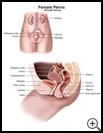
Midcycle Pain
________________________________________________________________________
KEY POINTS
- Many women have lower belly pain from time to time. If it happens about halfway between your menstrual periods, you may be having midcycle pain.
- Midcycle pain will normally go away on its own without treatment.
________________________________________________________________________
What is midcycle pain?
Many women have lower belly pain from time to time. If it happens about halfway between menstrual periods, it may be what is called midcycle pain or mittelschmerz. Some women notice it almost every cycle, while some women have never have it.
What is the cause?
Midcycle pain is usually caused by the release of an egg from your ovary (ovulation). It usually happens about two weeks before your next period is due. When the egg is released, fluid from around the egg can leak out of the ovary. This fluid may irritate the abdominal tissues and cause pain.
What are the symptoms?
The main symptom is mild discomfort or pain in your lower belly or pelvis. It may be on just one side or in the middle of your lower belly. The pain can switch from side-to-side, from cycle-to-cycle. You may have some mild nausea as well.
How is it diagnosed?
Your healthcare provider will ask about your symptoms and medical history and examine you, may do a pelvic exam.
How is it treated?
Midcycle pain will often go away on its own without treatment. The pain usually lasts a few minutes to a few hours, or even for a day or two. If it lasts longer, then it may be helped by taking a mild nonprescription pain medicine.
Take nonprescription pain medicine such as acetaminophen, ibuprofen, or naproxen to treat pain. Read the label and take as directed. Unless recommended by your healthcare provider, you should not take this medicine for more than 10 days.
- Nonsteroidal anti-inflammatory medicines (NSAIDs), such as ibuprofen, naproxen, and aspirin, may cause stomach bleeding and other problems. These risks increase with age.
- Acetaminophen may cause liver damage or other problems. Unless recommended by your provider, don't take more than 3000 milligrams (mg) in 24 hours. To make sure you don’t take too much, check other medicines you take to see if they also contain acetaminophen. Ask your provider if you need to avoid drinking alcohol while taking this medicine.
Birth control pills (oral contraceptives) may help if midcycle pain causes you a lot of pain or happens every month. Some hormone contraceptives prevent ovulation from happening, which will also prevent midcycle pain caused by ovulation. Talk with your healthcare provider about this option.
How can I take care of myself?
Follow the full course of treatment prescribed by your healthcare provider. In addition:
- If you have cramps or stomach pain, it may help to put a hot water bottle or heating pad on your stomach. Cover the hot water bottle with a towel, or set the heating pad on low so you don’t burn your skin. Don’t fall asleep with a heating pad plugged in.
- Soak in a warm tub.
- Gently massage your lower belly or lower back.
Ask your provider:
- How and when you will get your test results
- If there are activities you should avoid and when you can return to your normal activities
- How to take care of yourself at home
- What symptoms or problems you should watch for and what to do if you have them
Most midcycle pain episodes are not a sign of a serious health problem. Talk to your healthcare provider:
- If the pain is intense
- If you are concerned about how long it is lasting
- If you have a fever, nausea, or vomiting
- If you have pain or burning when you urinate
- If you have redness on the skin at the site of the pain
Make sure you know when you should come back for a checkup. Keep all appointments for provider visits or tests.
What can I do to help prevent midcycle pain?
- Take care of your health. Have checkups, including a pelvic exam and Pap test, as often as recommended by your healthcare provider so that any problems can be found and treated early.

